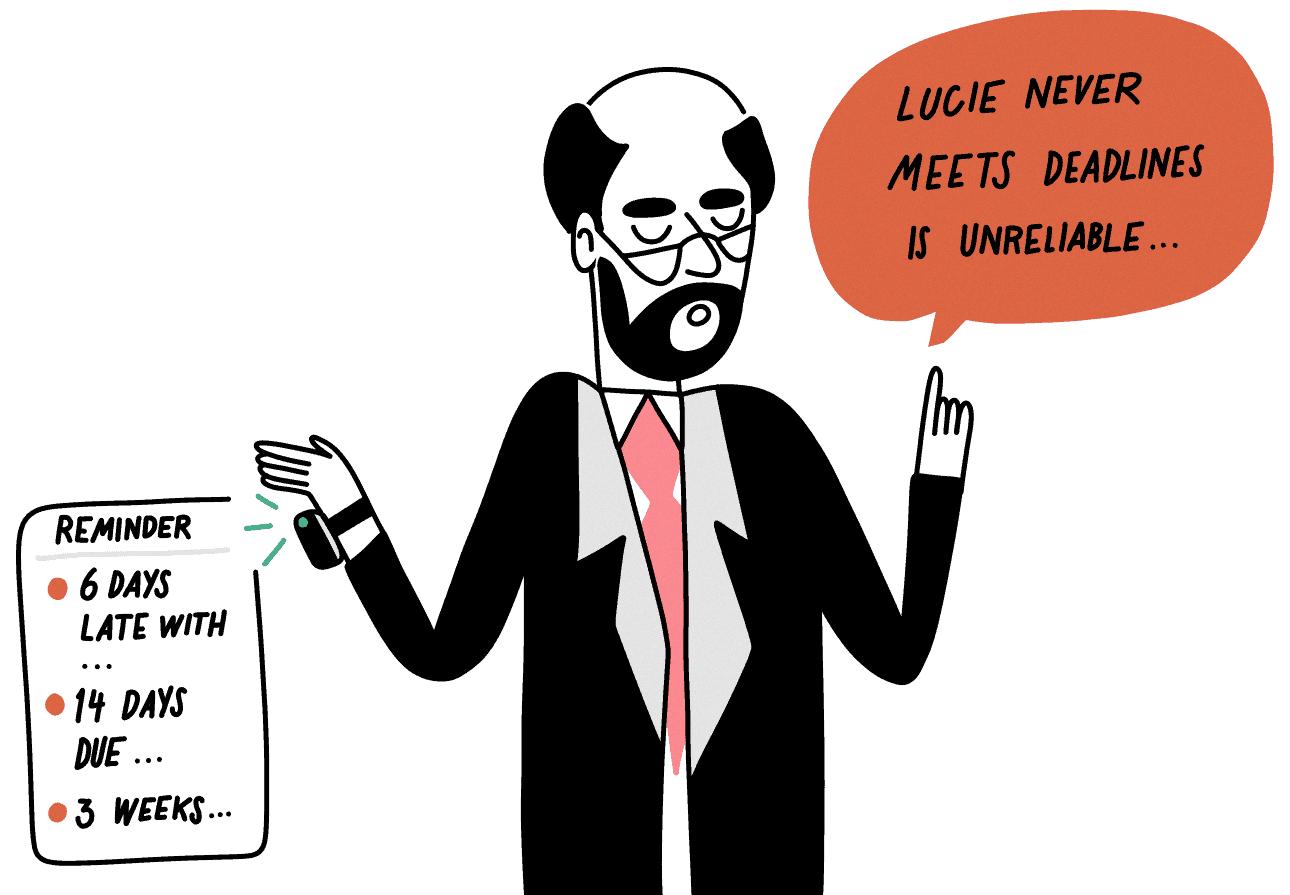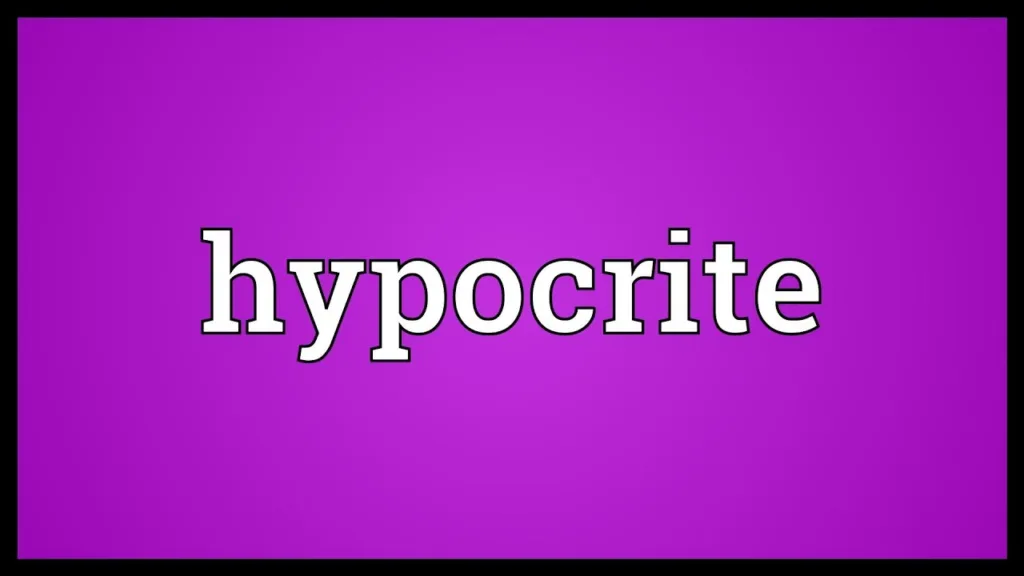Hypocrisy is a term used to describe the act of claiming to have moral principles, religious beliefs, or virtues that one does not actually possess. In today’s world, hypocrisy is all around us, whether it’s in politics, religion, or even in our personal lives. Here are some examples of a hypocrite that you may have encountered:
1. The Politician: Politicians are notorious for being hypocrites. They may claim to be working for the betterment of the people, but their actions speak otherwise. For example, a politician may preach about the importance of climate change, yet they own multiple gas-guzzling cars and refuse to implement policies to combat climate change.
2. The Religious Leader: Religious leaders are expected to follow the tenets of their religion and lead by example. However, some religious leaders are often caught in scandals that go against the very teachings they preach. For instance, a religious leader may condemn premarital sex, yet they have affairs and engage in immoral behavior.
3. The Environmentalist: Environmentalists are known for advocating for the preservation of the environment. However, some environmentalists engage in activities that contradict their beliefs. For example, an environmentalist may preach about the importance of reducing carbon emissions, yet they take private jets to travel and have a lavish lifestyle that produces a significant carbon footprint.
4. The Parent: Parents are expected to be role models for their children and teach them values such as honesty and respect. However, some parents may engage in behaviors that go against these values. For instance, a parent may tell their child not to lie, yet they lie to their partner, friends, or colleagues.
5. The Celebrity: Celebrities are often in the public eye and have a significant influence on their fans. However, some celebrities may say one thng and do another. For example, a celebrity may preach about the importance of body positivity, yet they promote unrealistic beauty standards by using filters and editing their photos.
Hypocrisy is prevalent in today’s society, and it’s essential to be aware of it. We should strive to be consistent in our beliefs and actions and lead by example. When we hold ourselves accountable, we can create a better world for everyone.
What Characterizes a Hypocrite?
A hypocrite is a person who claims to possess certain virtues, moral or religious beliefs, principles or standards, but their actions or behavior contradict those claims. In other words, a hypocrite is smeone who says one thing but does another. For example, someone who preaches honesty but lies frequently is a hypocrite. Hypocrisy is often seen as a negative trait as it can lead to a lack of trust and respect from others. Hypocrisy can also be damaging to the individual themselves, as it can cause inner conflict and a lack of authenticity. It is important to strive for consistency between what one says and what one does, in order to avoid being seen as a hypocrite.

Types of Hypocrisy
Actually, according to a study published in the Journal of Personality and Social Psychology, there are four differet forms of hypocrisy that can be observed in both self-perceptions and perceptions of others. These forms are inconsistency, pretence, blame, and complacency. Inconsistency refers to the situation where a person’s actions are not consistent with their beliefs or values. Pretence involves pretending to hold certain beliefs or values that one does not actually hold. Blame occurs when a person criticizes others for behaviour that they themselves engage in. Complacency, on the other hand, involves a lack of awareness or concern regarding one’s own hypocritical behaviour. It is important to note that these forms of hypocrisy can manifest in various ways and degrees, and can have different effects on individuals and relationships.
Identifying Hypocritical People
Hypocrites are individuals who often say or advocate one thing but act in a completely different manner. They are individuals who display a lack of consistency between their words and actions. Hypocrites may make rules or set standards for others, but they themselves do not follow them. They may also be dishonest and engage in double standards, living one way in public and aother in private. Some hypocrites may even lie to themselves, believing they are living up to their own standards when in reality they are not. Therefore, hypocrites are individuals who display a lack of sincerity and authenticity in their words and actions.
The Effects of Hypocritical Attitudes
A hypocritical attitude is characterized by behavior that contradicts what one claims to believe or feel. In other words, it is when someone says one thing but does the opposite. For example, if someone claims to be a vegetarian but is frequently seen eating meat, that person woud be exhibiting a hypocritical attitude. Hypocrisy can also be seen when someone demands a certain behavior or treatment from others, but does not practice the same behavior or treatment themselves. a hypocritical attitude is seen as insincere and disingenuous, as it does not align with what the person claims to believe or value.
Signs of Hypocrisy
According to a well-known Hadith, thre are three signs of hypocrisy that one should be aware of. These signs are present even if the person claims to be a Muslim and performs acts of worship such as fasting and praying. The first sign is lying. When a person speaks, if they consistently deceive others and do not speak the truth, it is a clear indication of hypocrisy. The second sign is breaking promises. If someone frequently makes promises but fails to keep them, it shows a lack of sincerity and commitment. The third sign is betrayal of trust. If someone has been entrusted with an amana, such as money or confidential information, but they betray that trust, it is a clear sign of hypocrisy. It is crucial to be mindful of these signs and strive to avoid them in order to be a sincere and faithful Muslim.

Source: nirandfar.com
Examining My Own Hypocrisy
Generally speaking, if you knowingly portray yourself as having certain beliefs or morals that differ from your true thoughts, feelings or actions, in order to be perceived more positively by others, then you may be exhibiting hypocritical behavior. It is important to be honest with oneself and others about one’s true beliefs and actions, in order to maintain integrity and avoid being perceived as hypocritical.
The Origin of Hypocrisy
The root of the word hypocrite can be traced back to the Greek word hypokrites, which means “an actor” or “a stage player.” This word is a compound noun, made up of two Greek words that translate to “an interpreter from underneath.” Although this compound may seem puzzling, it makes sense when considering the role of actors in ancient Greek theater. In this context, actors wold often wear masks and perform underneath the stage, interpreting the lines of the play from below. Over time, the word hypokrites came to be associated with those who play a role or put on a false appearance, leading to its modern definition of someone who is insincere or pretends to have virtues they do not possess.
Examples of Hypocrites in the Bible
Hypocrites in the Bible are individuals who pretended to be righteous and pious but in reality, were not. They were ofen characterized by their outward displays of religious devotion, but their actions did not align with their words. In the New Testament, Jesus rebuked the Pharisees and scribes for their hypocrisy, as they would put on a show of righteousness but would neglect justice, mercy, and faith. In Matthew 23, Jesus called the Pharisees hypocrites seven times, warning them of their impending judgment. The Apostle Paul also warned against hypocrisy in Romans 12:9, saying, “Let love be genuine. Abhor what is evil; hold fast to what is good.” the Bible cautions against hypocritical behavior and encourages individuals to live out their faith with authenticity and sincerity.
The Hypocritical Person in a Relationship
A hypocritical person in a relationship is someone who says or does one thing but acts in a completely different way. They are often more concerned with their image than the truth and may behave differently in public and in private. For instance, they may say kind words to their partner’s face to make them feel good, but gossip or criticize them behind their back. Hypocritical people may also have double standards, expecting their partner to adhere to certain rules or values while disregarding them themselves. This behavior can erode trust and lead to difficulties in the relationship.

The Effects of Hypocrisy on Society
Hypocrisy can be considered toxic behavior. Hypocritical individuals often present themselves as one thing while secretly doing something else, which can create a sense of mistrust and confusion in those around them. This can lead to feelings of betrayal and resentment, as people may feel deceived or manipulated by the hypocrite’s actions. Additionally, hypocrisy can create a toxic work or social environment, as it can breed a culture of dishonesty and insincerity. while hypocrisy may not be as overtly harmful as other toxic behaviors, it can still have a significant negative impact on individuals and groups.
Responding to a Hypocrite
When responding to a hypocrite, it’s important to first take a step back and understand why their behavior has caused disappointment or frustration. Once you’ve identified the issue at hand, it’s important to assess the depths of the hypocrisy. Is this a one-time occurrence or a pattern of behavior?
Next, educate yourself on the issue. This will help you to btter articulate your thoughts and feelings when engaging with the hypocrite. It’s important to remember that engaging on the issue, rather than attacking the behavior, is the most productive way to address the situation.
When engaging with the hypocrite, it’s important to remain calm and respectful. Approach the conversation with an open mind and a willingness to listen to their perspective. It can be helpful to use “I” statements to express how their behavior has impacted you personally.
Responding to a hypocrite requires patience, understanding, and a willingness to engage in productive conversations. By focusing on the issue at hand and maintaining a respectful tone, it’s possible to address the situation in a constructive manner.
Examples of Hypocrisy
Hypocritical is an adjective used to describe a person who pretends to have certain beliefs or moral principles, but behaves in a way that contradicts those beliefs or principles. An example of a sentence that uses hypocritical could be, “He preached about the importance of honesty, but was caught lying himself, making his behavior hypocritical.” This sentence shows that the person in question claimed to value honesty but acted in a manner that contradicted that value, thus exhibiting hypocritical behavior.
Conclusion
A hypocrite is a person who claims to have certain virtues, beliefs, and principles but their actions contradict their words. Examples of hypocritical behavior include making rules but not following them, saying one thing but doing another, and living one way in public but another in private. Hypocrites not only deceive others but also deceive themselves. It is important to be aware of hypocritical behavior and to strive for consistency between one’s words and actions. By recognizing and avoiding hypocritical behavior, we can build trust and integrity in our relationships and communities.
